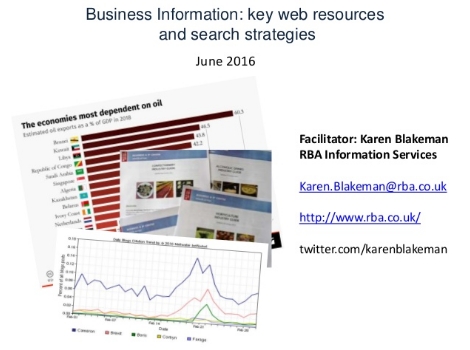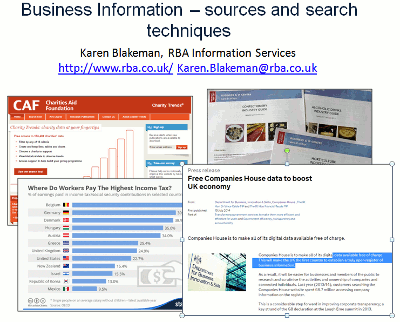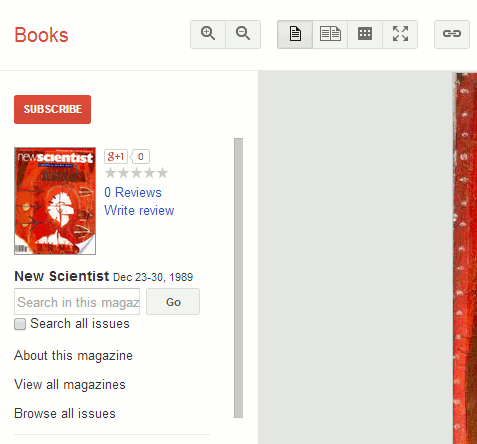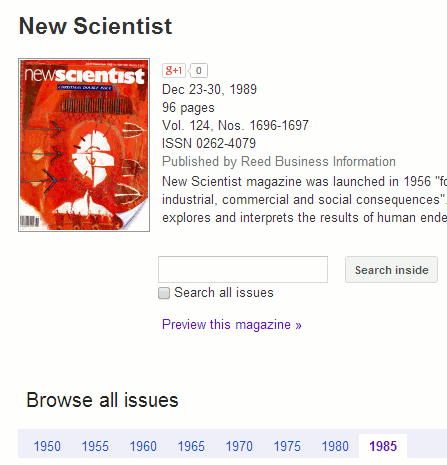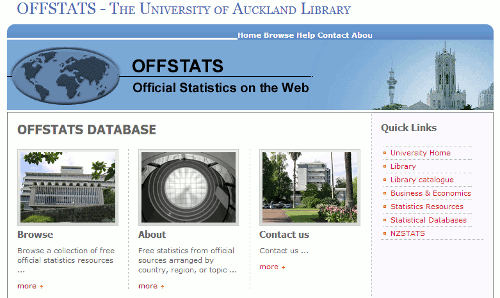Some of the slides that I used as part of my June 2016 workshops on Business Information are now available on both SlideShare and authorSTREAM. The workshop run in the last week of June inevitably included a session on the EU referendum and the Brexit result. A few of those extra slides are included in this edited version of the presentation.
Category Archives: workshops
Advanced Google workshop – Top Tips
This collection of Top Tips is a combined list nominated by those who attended the UKeiG workshop on “New Google, New Challenges”. The next UKeiG Google workshop will be run on 8th September 2016.
1. Do not trust Google’s facts and answers
Google tries to provide facts and quick answers to your queries at the top and to the right of your results. These are computer generated extracts from pages and several different sources may be used to produce an “answer”. They are sometimes misleading or completely wrong. At the time of writing, the answer provided for a search on frugivore is an excellent example. (It explains why your cat is so fussy over its food – it is obviously craving its 5 a Day!) Always go to the original source to double check the information, but this is not always provided by Google.
2. Country versions of Google and /ncr
Country versions of Google give priority to the local content. This is a useful strategy when searching for research groups, companies and people that are active or working in a particular country. Use the standard ISO two letter country code, for example http://www.google.fr/ for Google France, http://www.google.it/ for Google Italy.
It is also worth trying your search in Google.com. Your results will probably be more international or US focused but you may see new search features or layouts in Google.com that are not yet available elsewhere. If Google insists on redirecting you to your own country version, go to the bottom right hand corner of the Google home page and you should see a link to Google.com. If there is no link then add ‘/ncr’ to the Google URL, for example http://www.google.com/ncr .
The downside of using country versions of any search tool is that the prioritised information is likely to be in the local language.
3. Search history
Your search history, which is recorded and available for you to view if you are signed in to your Google account, is used by Google to help personalise your results but it can also be useful as a record of past searches. If a user comes back to you having forgotten or lost the search and documents you gave them your search history should be able to help you find both. On any search results page click on the cog wheel in the upper right hand area of the screen and select History. You can then browse your history or select a date from the calendar (upper right and area of the History screen).
4. Verbatim
This is an essential tool for making Google carry out your search the way you want it run. Google automatically looks for variations on your terms and sometimes drops terms from your search, which is not always helpful. To use Verbatim, first run your search. Then click on ‘Search tools’ in the menu that runs across the top of your results page. A second row of options should appear. Click on ‘All results’ and from the drop down menu select Verbatim. Google will then search for your terms without any variations or omissions. Note that Google will search for documents and pages in which the words appear in any order. If you are searching on the title of a paper place the title within double quote marks to force an exact phrase match. If Google still alters your search then run Verbatim.
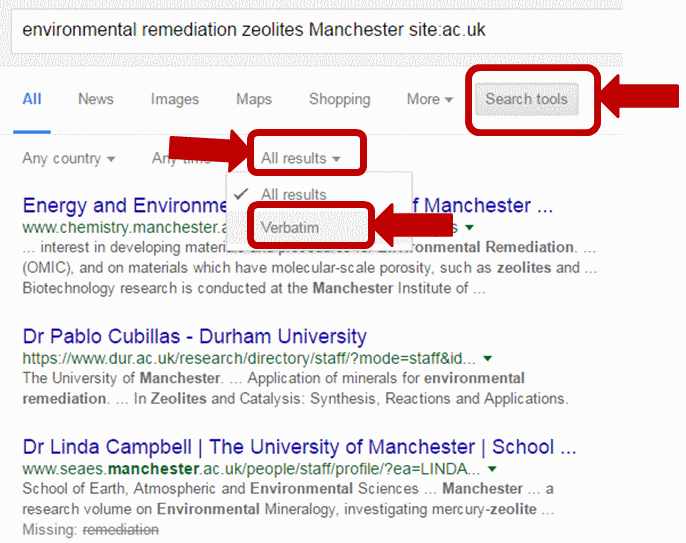
If you are carrying out in-depth research it is worth trying out Verbatim even if the “normal” Google results seem OK. You may see very different and possibly more relevant content.
5. filetype: command.
An important advanced search command that is available not only in Google but in many alternative search tools. Use the filetype: command to limit your research to PowerPoint for presentations, spreadsheets for data and statistics, or PDF for research papers and industry/government reports.
For example:
plasmonic nanoparticles filetype:ppt
The command must be all lower case and there must be no spaces between the colon and the command or the file extension, otherwise Google will treat the command as a searchable word. Also you must search for pre and post Office 2007 file extensions separately as Google does not automatically pick up both.
For example
plasmonic nanoparticles filetype:ppt OR filetype:pptx
Note that Google’s Advanced Search screen pull down menu for filetype: only searches for pre Office 2007 extensions.
6. Minus sign to exclude information
Use the minus sign immediately before a term to exclude documents containing that term, but use with care as you may lose valuable information. It can also be used with commands to exclude file formats or websites from your search.
For example:
occupational asthma UK site:gov.uk -site:hse.gov.uk
-site:nationalarchives.gov.uk
7. Combine search commands
Combine multiple commands such as filetype: and site: to focus your search. Use the OR command to search for alternatives, for example:
occupational asthma UK site:ac.uk filetype:ppt OR filetype:pptx
8.Personalise Google News
Personalise Google News (http://news.google.co.uk) page when signed in to your account and change what content is automatically displayed or add your own searches. Click on the Personalise button at the top of the right hand column.
9. Google Scholar Cite feature
Click on the Cite link under a reference in Google Scholar and Google will give you options to import a citation in MLA, APA, Chicago, Harvard or Vancouver style into BibTex, EndNote, RefMan or RefWorks. Note that if the article is only available online you may need to add a doi or a URL, and the date of access.
10. Use Google site: search on Google scholar
This is one I had not thought of but was recommended by one of the delegates as a way of using Google’s advanced search commands on Google Scholar instead of Scholar’s own. (I have not had time to test this one out myself).
Business information resources and search strategies
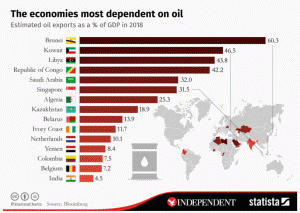 I’ve finally finished “updating” my slides and notes for the first of this year’s workshops on business information, which takes place next week. It was not so much an update, more a rewrite. With all the changes at Google, UK government website transfers and disappearances, the “right to be forgotten” and the many website design changes by business resources to make them mobile friendly I was virtually starting from scratch.
I’ve finally finished “updating” my slides and notes for the first of this year’s workshops on business information, which takes place next week. It was not so much an update, more a rewrite. With all the changes at Google, UK government website transfers and disappearances, the “right to be forgotten” and the many website design changes by business resources to make them mobile friendly I was virtually starting from scratch.
Next week’s workshop is being organised by TFPL in central London on Tuesday 8th March. TFPL have made the event the “Course of the Week” and reduced the price to £249, but you have to book by midnight on Friday 4th March to get the reduced price.
The topics I shall be covering include:
How the legal and regulatory environment is affecting search and the provision of information
Starting points, evaluated listings and government sources
Company information: share prices, financials, official data
Statistics, market and industry data, open data
News sources and alerting services
Essential search techniques for tracking down business information
How to use social media and professional networks for business intelligence
Where to find older, archived material
As usual, there will be practical sessions for people to try out resources and search techniques for themselves. If you are interested go to the TFPL website or contact their learning time on 020 7378 5477.
UKeiG Article: New Google, New Challenges

My article on major changes at Google, “New Google, New Challenges”, is now available in UKeiG’s latest issue of eLucidate at http://www.cilip.org.uk/uk-einformation-group/elucidate-ukeigs-journal/elucidate-current-issue/new-google-new-challenges
As well as the general dumbing down and relentless removal of search options, it covers the new technologies that Google is experimenting with: artificial intelligence, driver-less cars, robotics, home environment sensors and controls. Some of this is already being integrated with search and “mobile”.
I am running a “New Google, New Challenges” workshop for UKeiG this autumn in Manchester and London. It concentrates on search, how the changes at Google are impacting the way it manages our search and presents results, and how to use what is left of the advanced search techniques and specialist databases for more relevant research results.
Business information – sources and search techniques
I am running my full day business information, sources and search techniques workshop for the Commercial, Legal and Scientific Information Group (CLSIG).
Date: Thursday, 16 July 2015, 9:30am to 4:30pm
Venue: CILIP, 7 Ridgmount Street, WC1E 7AE London . See map: Google Maps
Cost: CLSIG/CILIP Members £85; Non-members £100; Concessions £50
Contact for bookings: Marie.cannon@nortonrosefulbright.com
For further details of the workshop content contact karen.blakeman@rba.co.uk
Search engines, government and official information sources, and the EU regulatory environment are continually changing. All of these affect how we search and the information that is presented to us. In some cases information may be deliberately excluded from our results. This one day workshop will look at what’s new, key resources for business and official information, and how to use search tools to ensure you are picking up everything that you need. There will be time for practical sessions so that you can try some of the exercises provided, or experiment with your own searches. Lunch and refreshments are included.
Topics covered include:
- effect of EU legislation on research and due diligence
- increase in official open data – accessibility, quality, usability
- changes to Google and other search tools, and their impact on research
- starting points, evaluated listings and government sources
- company information: official sources; free open data sources worldwide; companies that repackage official company information – pros and cons
- news sources and alerting services
- the value of social media and professional networks for business intelligence
- statistics, market and industry data
Please email Marie Cannon to book your place (Marie.cannon@nortonrosefulbright.com)
Google Top 10 Search Tips
These are the top 10 tips from the participants of a recent workshop on Google, organised by UKeiG and held on 9th April 2014. The edited slides from the day can be found on authorSTREAM at http://www.authorstream.com/Presentation/karenblakeman-2121264-making-google-behave-techniques-better-results/ and on Slideshare at http://www.slideshare.net/KarenBlakeman/making-google-behave-techniques-for-better-results
1. site:
Use the site: command to focus your search on particular types of site, for example site:nhs.uk for UK NHS websites, or to search inside a large rambling site. If you prefer you can use the Advanced search screen at http://www.google.co.uk/advanced_search and fill in the site or domain box
2. Verbatim
An essential tool for making Google behave and run your search the way you want it run. Google automatically looks for variations on your terms and sometimes drops terms from the search. To make Google run your search exactly as you have typed it in, first run your search. Then click on ‘Search tools’ in the menu above your results. In the second line of options that appears click on ‘All results’ and from the drop down menu select Verbatim.
3. intext:
Google’s automatic synonym search can be helpful in looking for alternative terms but if you want a term to be included in your search exactly as you have typed it in then prefix the word with intext:. For example heron island intext:parrots caversham UK.
4. Incognito/Private browsing
Even if you are not signed in to a Google account, Google personalises your results according to your search and browsing behaviour. If you want to burst out of the filter bubble, as it is often called, use a private browser window or incognito (Chrome). Google will then ignore tracking and search cookies on your machine. To call up a private browser or incognito window use the following keys:
Chrome – Ctrl+Shift+N
FireFox – Ctrl+Shift+P
Internet Explorer – Ctrl+Shift+P
5. Reading level
This changes the emphasis of the results that you see. Run your search and from the menu above the results select ‘Search tools’, then ‘All results’, and from the drop menu ‘Reading level’. Options for switching between basic, intermediate and advanced reading levels should then appear just above the results. Click on the Advanced option to see results biased towards research.
6. Date
To limit your search by date, for example the last month or year, first run your search. Then click on ‘Search tools’ in the menu above the results and from the second row of options that appears click on ‘Any time’. Select your time period or a custom range from the drop down menu. Unfortunately, this does not work with Verbatim. You could use the ‘daterange:’ command instead to specify your dates and then apply Verbatim, but you first have to convert you dates to Julian format. The Julian Date Converter at http://aa.usno.navy.mil/data/docs/JulianDate.php tells you more about the format and provides a tool for converting dates. Alternatively, using something like Gmacker (http://gmacker.com/web/content/gDateRange/gdr.htm). This enables you to enter your search terms and select your dates from a calendar. It then runs your search and on the Google results page you can apply Verbatim in the usual way.
7. Cached
The cached option enables you to view the copy of the page that Google has in its database. This is useful when the current version of a page seems to differ signicantly from the one described in the Google search results. Click on the little green arrow next to the URL of the page on the results list and then select Cached.
8. filetype:
Use the filetype: command to limit your research to PowerPoint for presentations, spreadsheets for data and statistics or PDF for research papers and industry/government reports. One workshop participant found it to be a great way to track down conference poster presentations by combining PDF and PowerPoint filetypes with keywords and the term ‘poster’.
9. Country versions of Google
The country versions of Google give priority to the country’s local content, although it might be in the local language. This is a useful strategy when searching for industries, companies and people that are active in a particular country. Use the standard ISO two letter country code, for example http://www.google.fr/ for Google France, http://www.google.it/ for Google Italy.
10. Books – About this magazine
Several people were interested in Google Books and in the magazine archives in particular. Google does not, though, make it easy to browse a magazine’s archives. Once you have identified a series that is of interest it would seem logical to click on “Browse all issues” to view a list of what is available.
However, it seems to list the years of the issues randomly. Selecting “About this magazine” brings up some brief information about the title and links that enable you to browse past issues by year.
Top search tips from Exeter and Bristol
A couple of weeks ago I was in Exeter and Bristol leading workshops for NHS South West on “Google & Beyond”. We covered advanced Google commands, Google Scholar and alternatives to Google. Below are the combined top tips from the two sessions. I may have missed a couple from the list as I could not read my writing, so if you attended one of the workshops let me know if I’ve omitted your suggested tip.
- Verbatim Yet again, this has topped the list of useful Google search options. Google automatically looks for variations on your search terms and sometimes drops terms from your search without telling or asking you. To make Google run your search exactly as you have typed it in, first run your search. Then click on ‘Search tools’ in the menu above your results, in the second line of options that appears click on ‘All results’ and from the drop down menu select Verbatim.
- Be aware of personalisation. Even if you are not signed in to a Google account Google personalises your results according to your search and browsing behaviour. Personalisation is not necessarily a bad thing but if your want to burst out of the filter bubble, as it is often called, use a private browser window or incognito (Chrome). Google will then ignore tracking and search cookies on your machine and will not personalise your results. To call up a private browser or incognito window use the following keys:
Chrome – Ctrl+Shift+N
FireFox – Ctrl+Shift+P
Internet Explorer – Ctrl+Shift+P
- site: Use the site: command to focus your search on particular types of site, for example site:nhs.uk, or to search inside a large, rambling site. You can also use -site: to exclude sites from your search.
- intext: Google’s automatic synonym search can be helpful when looking for alternative terms, but if you want a term to be included in your search exactly as you have typed it then prefix the word with
intext:. - filetype: Use the filetype: command to limit your research to PowerPoint for presentations, spreadsheets for data and statistics or PDF for research papers and industry/government reports. Note that in Google filetype:ppt and filetype:xls will not pick up the newer .pptx and xlsx formats so you will need to include those in your strategy, for example filetype:ppt OR filetype:pptx, or run separate searches for each one. In Bing.com, though, filetype:pptx will pick up both .ppt and .pptx files.
- Advanced search commands and search options Learn how to use the search commands (for example
intext:, filetype:andsite:). Many of these can be used on the advanced search screen that can usually be found under the cog wheel in the upper right hand area of the screen, but that link sometimes disappears so learning the commands is a better bet. A list of the more useful Google commands is at http://www.rba.co.uk/search/SelectedGoogleCommands.shtml. - Combine advanced search commands. Practise combining the advanced search commands for a more precise, focused set of results.
- Google Reading level. This changes the type of results that you see. Run your search and from the menu above the results select ‘Search tools’, ‘All results’ and from the drop menu ‘Reading level’. Options for switching between basic, intermediate and advanced reading levels should then appear just above the results. Click on the Advanced option to see results biased towards research. Google does not give much away as to how it calculates the reading level and it has nothing to do with the reading age that publishers assign to publications. It seems to involve an analysis of sentence structure, the length of sentences, the length of the document and whether scientific or industry specific terminology appears in the page.
- Numeric range. This command is unique to Google. Use it for anything to do with numbers – years, temperatures, weights, distances, prices etc. Simply type in your two numbers separated by two full stops as part of your search. This is a good way of limiting your search, for example, to forecasts over the few years.
- Limiting your search by date. To limit your search by date, for example the last month or year, first run your search. Then click on ‘Search tools’ in the menu above the results and from the second row of options that appears click on ‘Any time’. Select your time period or a custom range from the drop down menu.
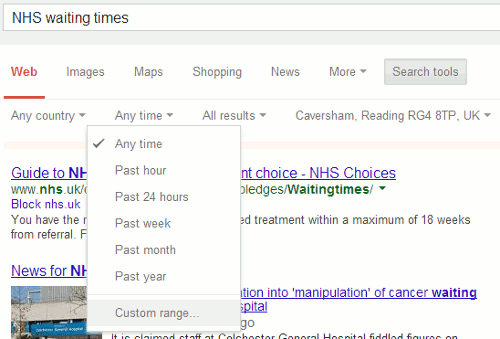
- Use the minus sign to exclude documents containing a word. If you do not want documents containing a specific word prefix that word term with a minus sign. The minus sign can also be used with commands such as site: and filetype: to remove an individual site or type of document from your results.
- Million Short http://millionshort.com/. If you are fed up with seeing the same results from Google again and again give Million Short a try. Million Short runs your search and you can choose to remove the most popular web sites from the results. Originally, as its name suggests, it automatically removed the top 1 million but now you can choose to remove the most popular 100, 1000, 10k, 100k or million sites. The page that best answers your question might not be well optimised for search engines or might cover a topic that is so “niche” that it never makes it into the top results in Google or Bing.
- Creative commons searches for images. Rather than search for images and go through them individually to find one that you can legally use in your document or presentation, use advanced search options or tools that allow you to select the appropriate license from the start. In Google, use the usage rights menu on the image advanced search screen to search for images with the license you need. The US version of Bing images includes a license option in the menu at the top of your results.
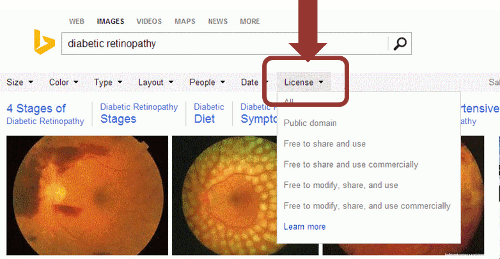
Double check the license of the photo on the website or blog hosting it. The license you need may be associated with a different image and yours could, for example, be ‘all rights reserved’.Flickr has a page where you can search for images with a specific Creative Commons license at http://www.flickr.com/creativecommons.
- Compare in Google. This is not a Google command but if you type in a search such as
compare carrots with cabbageGoogle will create a table comparing the properties of the two items. Google has been known to get some of the data wrong, though, so it’s worth double checking the figures before you use them. - Web archives. Want to see what was on a website a few years ago or trying to track down a document that seems to have vanished from the web? Try the Internet Archive Wayback Machine at http://www.archive.org/. Enter the URL of the website or document and you should then see a calendar of the snapshots that the archive has of the site or document. Choose a date from the calendar to view the page. The archive does not have everything but it is worth a try. See also the UK National Archives of old government websites and pages at http://www.nationalarchives.gov.uk/webarchive/ and the UK Web Archive at http://www.webarchive.org.uk/ukwa/.
- Statistics sites. Although you can often find statistics via Google, you may find dedicated official statistics sites quicker and more reliable. Some of the sites we covered during the workshops were:
NHS Statistics Links http://www.nhs.uk/Pages/LinkListing.aspx?CategoryId=Statistics
UK National Statistics Publication Hub http://www.statistics.gov.uk/
Office for National Statistics http://www.ons.gov.uk/
Welsh Government Statistics http://wales.gov.uk/topics/statistics/
Welsh Assembly Government StatsWales http://statswales.wales.gov.uk/
UK Open data http://data.gov.uk/
Eurostat http://ec.europa.eu/eurostat/
European Union Open Data Portal http://open-dat.europa.eu/en/
Zanran http://www.zanran.com/
Top tips from the latest business information workshop
Delegates at yesterday’s business information workshop in London came up with an interesting combination of websites and search commands for their end of day top tips.
- OFFSTATS – Official Statistics on the Web http://www.offstats.auckland.ac.nz Excellent starting point for official statistical sources by country, region subject or a combination of categories. All of the content in the database is in the public domain and available through the Internet.
- GMacker http://gmacker.com/web/content/gDateRange/gdr.htm Google’s Verbatim in the search options menu on the results page is great. Google’s date option from the same menu is great. But you cannot use both together. You can use the daterange: command, though, with Verbatim but it’s complicated. GMacker is a much easier way to do it. Type in your search on the GMacker page, select your dates from the calendars and click on ‘Google Search’. When the results appear on Google simply apply Verbatim in the usual way.
- Domain Tools http://www.domaintools.com/ A useful tool for identifying who owns the domain name of a website.
- 7 side http://www.7side.co.uk/ was recommended for its International company information services.
- Zanran http://zanran.com/This is a search tool for searching information contained in charts, graphs and tables of data and within formatted documents such as PDFs, Excel spreadsheets and images. Enter your search terms and optionally limit your search by date and/or format type.
- News alerts, news curation services and automated newsletter generation. Use Google alerts, RSS feeds and newsletter generation sites such as Paper.li (http://paper.li/) and Scoop.it (http://www.scoop.it/) to keep up to date and share news with colleagues.
- site: command Use the site: command to focus your search on particular types of site, for example site:ac.uk, or to search inside a large rambling site. You can also use -site: to exclude sites from your search.
- Numeric range This command is unique to Google. Use it for anything to do with numbers – years, temperatures, weights, distances, prices etc. Simply type in your two numbers separated by two full stops as part of your search. A good way of limiting your search to pages or news covering a company’s activities over two or three years in the past.
- OpenCorporates “The Open Database Of The Corporate World” http://opencorporates.com/ Provides access to open corporate data on 55 million companies in 75 jurisdictions. You can search all jurisdictions at the same time or select just one. Results can be filtered by type of data held, current status, company type, SIC. A link to the original registry page for a company is always included with the displayed information.
- DataMarket http://datamarket.com/ A portal to thousands of free and priced datasets. Free to search, and create charts and visualisations of the free data.
Does price guarantee quality of information?
I recently co-presented a webinar on researching legal information. The event was organised by TFPL, and Alan Blanchard and myself reviewed free and paid for resources together with key search techniques.
Throughout the session we polled the audience on a number of issues, the first question being “Does price guarantee quality when you are purchasing information?”. Surprisingly, given the topic of the webinar, 70% voted ‘No’ with the remaining 30% opting for ‘I don’t know’ rather than ‘Yes’. When we asked about their opinions on free information, though, 79% said they would need a result from a free source to be validated with a paid resource.
The audience could not qualify their answers – it was a simple yes/no/don’t know – but there were some interesting discussions on the issues after the event. The priced services certainly have to work hard to prove value for money and they cannot assume that their users will automatically renew each year. Free information has a big part to play in legal and business research but it is vital that one is aware of the limitations of free. For example, do you know how up to date legislation.gov.uk is and if it carries revised legislation? (See http://www.legislation.gov.uk/help#aboutRevDate for the answer). And then there is the issue of making Google run your search the way you want it run, without personalisation or deviation.
I am running two public access workshops this autumn for TFPL that look at free versus fee resources for business and legal information. The first, on 19th September 2013, is Business information: key web resources and covers:
- Portals and key starting points
- Company information
- Industry information
- Official statistics, market research
- News sources, RSS and alerting services
- Social media and professional networks
The second is Free resources and search techniques for EU and UK legislation and is on 13th November 2013. It will be looking at:
- How to use advanced search commands to find news and information on legislation
- How to use reading level and date ranges to focus the search
- Searching foreign language pages
- Options for searching journals, research information, grey literature
- Alternatives to Google, specialist tools and sites
- Assessing quality and relevance
Both days include practical sessions and places on the workshops are limited. Contact TFPL for further information and bookings.
Top Tips from SWAMP

Towards the end of June I headed off to Swansea Central Library to facilitate a workshop on search tools and techniques for finding business information and statistics. The session was organised for the libraries of the wonderfully named SWAMP – South West and Mid Wales Partnership.
We had fantastic views from the library of the sea and shore line so they did very well to remain focused on the work in hand. The top tips that the group suggested at the end of the day were a mixture of search techniques and business information sites.
1. Persistence.
Don’t give up and don’t get stuck in a rut. If your first attempts fail to produce anything useful try a different approach to your search. Try some of the tips mentioned below: use advanced search commands, a different search tool or go direct to a website that covers your subject area or type of information.
2. Verbatim.
Google automatically looks for variations on your search terms and sometimes drops terms from your search without telling or asking you. To beat Google into submission and make it run your search exactly as you have typed it in, click on ‘Search tools’ in the menu above your results, then click on the arrow next to ‘All results’ and from the drop down menu select Verbatim.
3. Private Browsing.
To stop search engines personalising your results according to your previous searches and browsing behaviour, find out where the private browsing option is in your browser (in Chrome it is called Incognito). This ignores all cookies and past search history and is as close as you can get to unfiltered results.
Short cuts to private browsing in the main browsers are:
Chrome – Ctrl+Shift+N
FireFox – Ctrl+Shift+P
Internet Explorer – Ctrl+Shift+P
Opera – Ctrl+Shift+N
Safari – click on Safari next to the Apple symbol in the menu bar, select Private Browsing and then click on OK.
4. The site: command.
Include the site: command in your search to focus your search on particular types of site, for example site:ac.uk, or to search inside a large rambling site. You can also use -site: to exclude sites from your search. For example, if you are searching for information on Wales and Australian websites mentioning New South Wales keep coming up include -site:au in your search.
5. The filetype: command.
Use the filetype: command to limit your research to PowerPoint for presentations, spreadsheets for data and statistics or PDF for research papers and industry/government reports. Note that in Google filetype:ppt and filetype:xls will not pick up the newer .pptx and xlsx formats so you will need to incorporate both into your strategy, for example filetype:ppt OR filetype:pptx, or run separate searches for each one. In Bing.com, though, filetype:pptx will pick up both .ppt and .pptx files.
6. Guardian Data Store (http://www.guardian.co.uk/data/)
For datasets and visualisations relating to stories in the news. This is proving to be a very popular site on both the public and in-house workshops. As well as the graphs and interactive maps the source of the data is always given and there are links to the original datasets that are used in the articles.
7. Company Check (http://www.companycheck.co.uk/)
Company Check repackages Companies House data and provides 5 years of figures and graphs for Cash at Bank, Net Worth, Total Liabilities and Total Current Liabilities free of charge. It also lists the directors of a company. Click on a director’s name and you can view other current and past directorships for that person.
8. BL BIPC industry Guides
The British Library Business Information and IP Centre’s industry guides at http://www.bl.uk/bipc/dbandpubs/Industry%20guides/industry.html highlight relevant industry directories, databases, publications and web sites. Excellent starting points if you are new to the sector.
9. Web archives for documents, pages and sites that are no longer “live”.
Most people know about the Internet Archive’s Wayback Machine at http://www.archive.org/and its collection of snapshots of websites taken over the years. There is also a collection of old UK government webpages at http://www.nationalarchives.gov.uk/webarchive/, and the British Library has a UK web archive at http://www.webarchive.org.uk/ukwa/.
10. Keep up to date
Keep up to date with what the search engines are up to, changes to key resources and new sites. Identify blogs and commentators that are relevant to your research interests and subject areas and follow them using RSS or email alerts.
